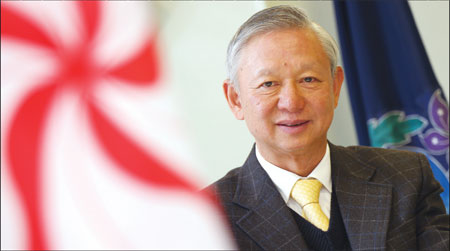War against corruption
Updated: 2013-01-11 07:02
By Joseph Li(HK Edition)
|
|||||||||
|
Ambrose Lee, newly elected NPC deputy, hopes he can help fight corruption on the mainland over the next five years. All Phohos: Edmond Tang / China Daily |

Ambrose Lee, a newly-elected deputy to the National People's Congress, expresses hope that he will be able to draw on his previous experience to help fight corruption and build the rule of law on the mainland. As the former security chief of the HKSAR government, he noted increasing political protests, but most of the protesters are law-abiding, with only a small number of radicals who resort to violence. Lee also criticized protesters who carry British-Hong Kong flags as inappropriate. Joseph Li writes.
Ambrose Lee left the Hong Kong SAR government in July 2012 at the age of 64, after serving as secretary for security for nine years. Recently, he emerged from retirement and stood for election as a local deputy to the National People's Congress (NPC). He finished second among the 36 elected as deputies with 1,387 votes. He also scored the highest number of votes of any of the first time entrants.
Fresh from a Christmas holiday in Australia, Lee said he enjoyed retirement life because he had more time to stay with his family, do things he like and have fun with his two grandchildren. But many friends suggested he make use of his rich experience and good health. He therefore decided to run for the NPC.
"China has made enviable accomplishments over the 30 years of reform and opening," Lee told China Daily in an exclusive interview. "Economic development in particular, China's rise as the world's second largest economy is a miracle, because we took only three decades to achieve what other countries achieved in a century or two."
Lee, however, observed that the mainland's development in other areas, such as battling corruption and imposing the rule of law, has not moved at the same pace as economic development, although mainland people honed their political awareness concurrent with their improved living standard.
"In recent years, many of the people's activities were connected with government policy and legal system failures," he commented. "Since I was involved in anti-corruption and law enforcement during my 38 years' service with the Hong Kong government, I hope I can help fight corruption on the mainland over the next five years.
"Xi Jinping, the new party chief of the Communist Party of China, has repeatedly emphasized the importance of fighting corruption and building a clean society. So I firmly believe he is determined to push forward an anti-graft drive in the country."
Lee does not have detailed anti-corruption proposals for the country, given he is elected less than a month ago. He said he will come up with viable suggestions after consulting the 35 fellow deputies and mainland experts.
Apart from the annual NPC meeting, he will advance his suggestions to mainland ministries and departments.
"Some veteran deputies told me that the central government attaches great importance to the suggestions of NPC deputies, while the relevant ministries and departments are required to respond to proposals and enquiries from the deputies," he said.
The model of Hong Kong's Independent Commission Against Corruption (ICAC), which enjoys a very high reputation at the international level, could be applicable to the mainland, he suggested, but the success of the anti-graft drive hinges on two major factors.
"First, it must have the support of the highest state leaders. Otherwise, the government may fight corruption vigorously today but become lax the next day," he said, citing the example of the staunch efforts of Hong Kong Governor Murray MacLehose to combat corruption in the 1970s.
Lee further said the anti-graft drive must be supported by perseverance, saying: "The war against corruption in Hong Kong had lasted a generation of about 30 years since the early 1970s. It was not until the late 1990s could Hong Kong claim itself a relatively clean, corruption-free community."
Former Chief Executive Donald Tsang and former chief secretary Raphael Hui were accused of accepting advantages while in office.
"I feel unhappy to see former colleagues involved in corruption allegations," Lee said solemnly, but he stressed that there is so far no evidence to prove Tsang has committed graft.
"As to Mr Hui, he has been charged and is awaiting trial, but he is not guilty unless convicted. His case tells us that it is exactly the system in Hong Kong that we can trust. Although he was the second in command of the government, he still has to face the long arm of justice."
Lee thinks the mainland may borrow the ICAC model.
"But given China's vast territory and huge population, while there are differences in the development between the eastern and western regions and the quality of Chinese nationals needs improvement, the war against corruption cannot be won in less than a generation and we must persevere," he stressed.
(HK Edition 01/11/2013 page4)
